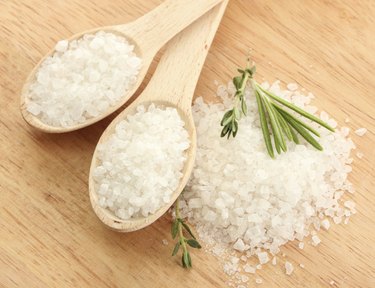
Sodium is an important nutrient in the diet. However, the modern American diet contains excessive amounts of salt, which can affect many different parts of the body. For example, eating too much sodium in your diet can cause negative effects on the skin that can make you not look and feel your best.
Salt's Effects in the Body
Video of the Day
Sodium, which is also referred to as "salt," is a vital nutrient that the body needs to function properly. However, eating too much sodium can lead to many unwanted side effects in the body, including hypertension, edema, bloating and dehydration. Salt is often added onto food, but it can also be found in high amounts in processed and packaged foods, such as chips, crackers, seasoned rice dishes, canned soups and cheese.
Video of the Day
Consequences for Skin
When your body experiences the negative effects from consuming too much sodium, your skin experiences it as well. Your face may become puffy and bloated-looking due to water retention caused by too much salt in the diet, and you might develop bags beneath your eyes. Skin can become dry and cracked, or it might develop an overproduction of oil as the oil glands try to compensate for the dehydration of the skin. This can lead to skin breakouts.
Alternatives
Instead of using salt to season your food, try using fresh or dried herbs, fresh lemon juice, oil and balsamic vinegar, or pepper. Avoid eating processed or packaged foods, and instead make as many foods as you can from whole food sources. Avoid sodas and energy drinks, which often container higher levels of sodium and are considered a hidden source of salt intake.
Considerations
Always check with your medical or holistic doctor before reducing or eliminating sodium from your diet as a way to treat your skin. Certain health conditions, such as diabetes, can be negatively effected by a sudden change in salt intake. Your doctor can run tests to determine if a reduced-sodium diet is appropriate for you.